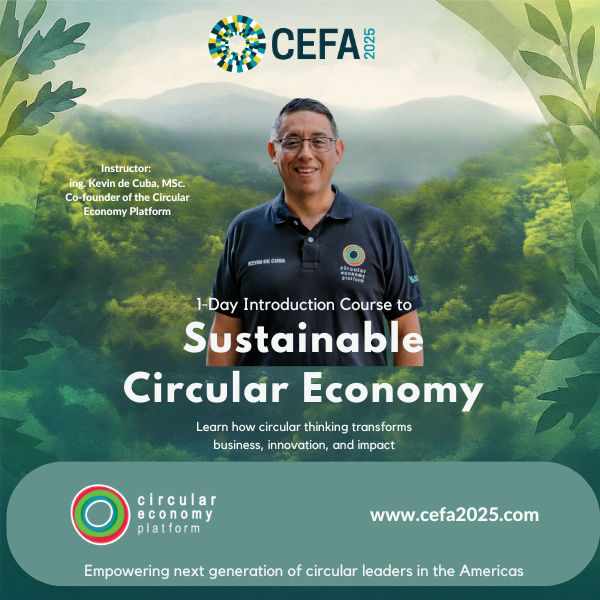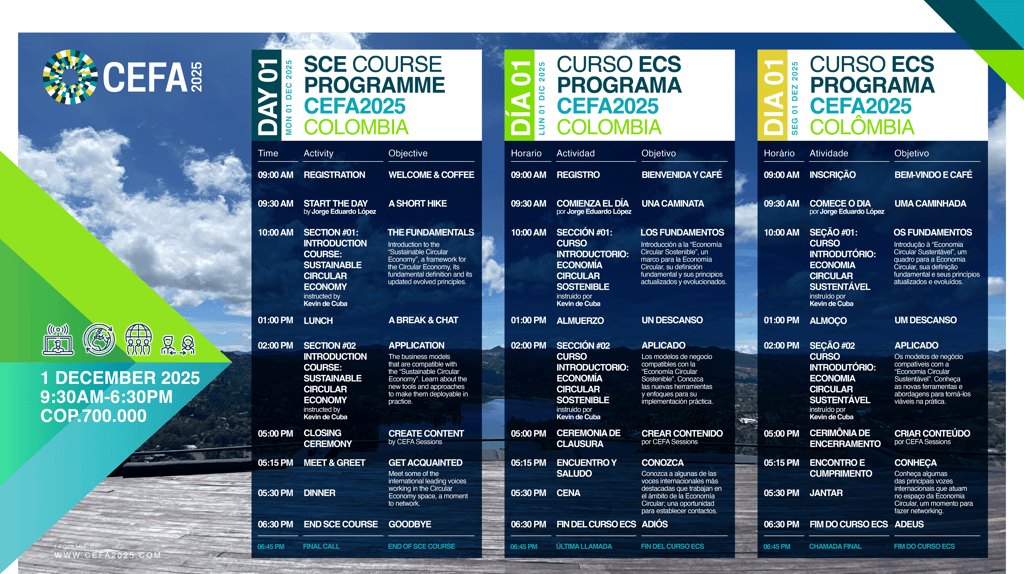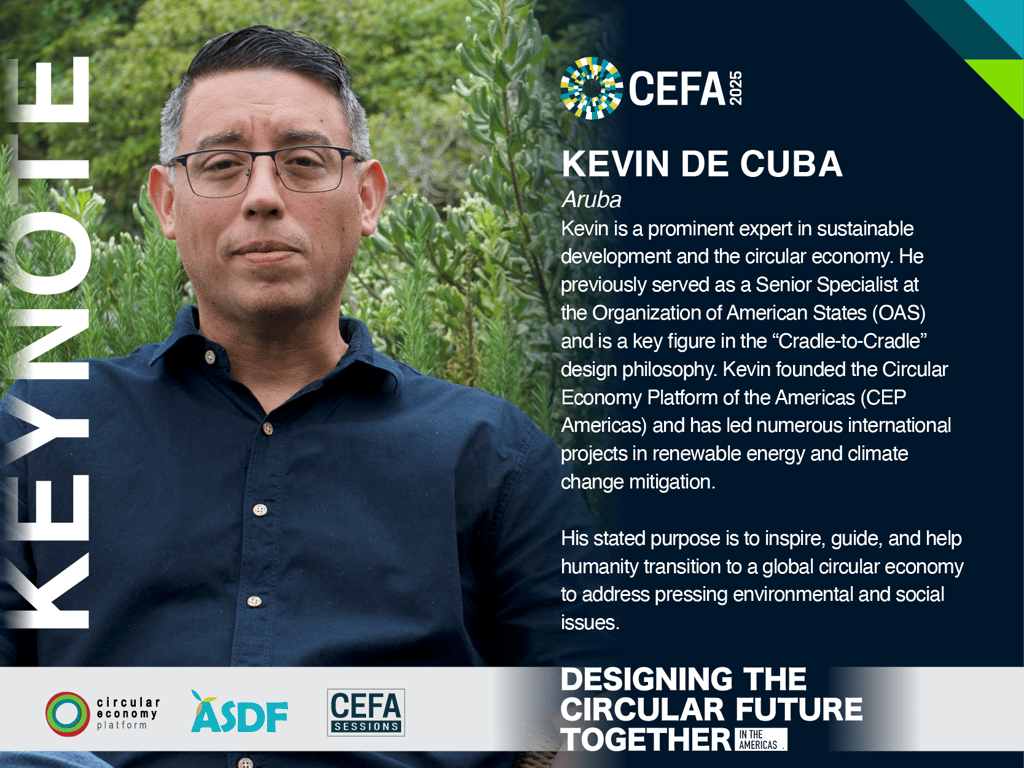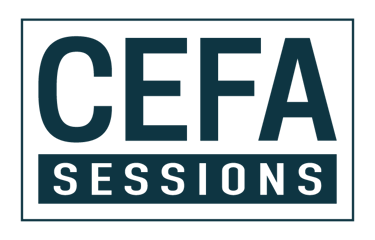Register here for the 1-day Sustainable Circular Economy course at CEFA2025
Sustainable Circular Economy Introduction Course
1-Day Course: Introduction to the Sustainable Circular Economy (individual)
Date: Monday, 01 December, 2025
Time: 9:30AM - 6:30PM
Location: Km 27 Via Las Palmas VDA Los Salados URB Ziruma CA 121
Includes: Lunch & Dinner, all-day coffee+snacks.
Personal investment:
Prior to November 28, 2025 COP700.000 (Colombian Pesos) IVA included, for 1 person.


Only COP700.000 per person!
Sign up, Pay, and secure your spot
Full day training (6 hours interactive learning) focused on introduction to a Sustainable Circular Economy (SCE) provided by the Circular Economy Platform (CEP);
Lunch and dinner (vegetarian options available); with coffee and snacks station available throughout the day;
Access and use of all venue amenities, including high-speed wifi, co-working spaces, and other amenities during breaks;
Access to copies of edited audio-visual recorded material captured during the 1-day SCE Course at CEFA2025;
Certificate of Completion of the SCE Introduction Course at CEFA2025, accredited by CEP; and
Access to this unique intimate professional ecosystem to make personal connections, and learn about the value and relevance of circular economy inspired solutions and tools for your professional career and business.
**Please note that the REGISTRATION does not include domestic or international (air)-travel costs to attend the 1-day SCE Introduction Course at CEFA2025. If you are locally based, we recommend taking a taxi or a sharing platform service (uber, cabify, or other) as there is limited parking space at the venue. Thanks in advance for your understanding and cooperation.
Registration includes:
DECEMBER 01, 2025
EL SILICON VALLEY


The 1-day Program (December 01, 2025 | El Silicon Valley)
What is this course about?
This 1-day introduction course introduces the concept of the Sustainable Circular Economy (SCE)—an evolved framework that integrates social, environmental, and economic dimensions to ensure human well-being within planetary boundaries.
Building upon earlier circular economy models, the SCE arises from the recognition that the economy is ultimately nested within society, which itself depends on the integrity of the biosphere. Its purpose is to guide entrepreneurs and businesses toward practices that regenerate natural systems, strengthen local communities, and ensure prosperity for present and future generations — thereby addressing the fundamental failures of the global linear economic system that have led to ecological degradation, social inequities, and unsustainable consumption patterns.
The Sustainable Circular Economy is a human-centered circular economic framework that aims to enhance social awareness and the well-being of current and future generations, in harmony with diverse ecosystems and social systems. It ensures that human activity does not compromise the planet’s capacity to sustain life and is grounded in respect for cultural diversity and multi-generational responsibility.
The guiding principles of a Sustainable Circular Economy...
The SCE is guided by 11 interrelated principles that reorient production, consumption, and decision-making towards regenerative and human-centered outcomes:
1. Prioritize fundamental human needs – Innovate around real human necessities (subsistence, protection, affection, understanding, participation, creation, identity, freedom, and spirituality) instead of promoting consumerism.
2. Question the need to use physical products – Explore non-material solutions such as dematerialization, digitalization, and multifunctional systems to reduce environmental impact.
3. Use only healthy, non-toxic materials – Ensure products are free from harmful substances, applying precautionary principles in material selection.
4. Define intended use cycles – Design products for specific, foreseeable life cycles, with clear understanding of use duration, location, and potential reintegration into biological or technical systems.
5. Rethink and redesign for circularity – Embed circular design principles (Cradle-to-Cradle, eco-effectiveness, modularity) to allow easy disassembly and recovery of value.
6. Optimize relationships with target users – Transition from ownership models to service-oriented systems (“product-as-a-service”), fostering long-term relationships and local value retention.
7. Prioritize local over global – Strengthen local economies and ancestral practices while promoting global cooperation and knowledge exchange.
8. Sustain cycles with renewable energy – Power production and material cycles using responsibly sourced renewable energy, respecting ecosystem regeneration.
9. Use water and ecosystem services wisely – Understand the interdependence of business activities with biogeochemical cycles (water, carbon, nitrogen, phosphorus, oxygen, sulfur, potassium) and design operations within ecological limits.
10. Value and circulate multiple forms of capital – Recognize eight forms of wealth (natural, social, cultural, intellectual, experiential, spiritual, material, financial), encouraging a holistic approach to value creation beyond monetary capital.
11. “Circular Forward” thinking – Ensure that today’s actions generate positive, long-term, multigenerational impacts, fostering resilience and intergenerational equity.
Sustainable Circular Economy's conceptual backbone...
The SCE framework draws from and synthesizes several complementary schools of thought that together form its conceptual backbone:
Cradle to Cradle Design (C2C) – Encourages products and systems designed for continuous reuse, disassembly, and regeneration — focusing on eco-effectiveness rather than mere efficiency.
Biomimicry – Emulates nature’s principles and processes to create designs that are inherently sustainable, resilient, and regenerative.
Performance Economy – With focus on services and functionality instead of products.
Natural Capitalism – Re-frames capitalism by recognizing ecological systems as valuable forms of capital, emphasizing resource productivity, service-based economies, and restorative industrial systems.
Industrial Ecology – Treats industrial systems as part of the broader ecosystem, encouraging closed-loop material flows and symbiotic relationships among industries.
Blue Economy – Efficiency inspired by nature’s ecosystems.
Regenerative Design – Moves beyond sustainability toward systems that restore and renew ecological and social capital.
Permaculture – Provides a holistic framework for designing human systems that mimic natural ecosystems and foster resilience, diversity, and circular interdependence.
Bioeconomy – Promotes the use of renewable biological resources and ecosystem services to replace fossil-based materials and sustain life-supporting cycles.
Doughnut Economics – Balancing social foundations and ecological ceilings.
Circular Human Sphere – Emphasizing human consciousness and ethical responsibility.
Together, these models converge to form an anthropocentric yet ecologically grounded economic paradigm that encourages creative, regenerative human action.
ABOUT THE INSTRUCTOR:
ing. Kevin H. de Cuba, MSc | Senior Advisor on Circular Economy & Sustainable Development
With over two decades of international experience, Kevin H. de Cuba is a recognized thought-leader, advisor, and entrepreneur driving the transition toward circular and sustainable economic systems across Latin America and the Caribbean. A Dutch national born in Aruba, Kevin blends technical expertise, strategic foresight, and an entrepreneurial mindset to support governments, development agencies, and private-sector leaders in designing and implementing innovative circular economy solutions.
Kevin has successfully led or contributed to 30+ international cooperation projects funded by the European Union, United Nations, World Bank, IDB, USAID, GIZ, and the Organization of American States (OAS). His leadership experience spans multiple roles, including Senior Circular Economy Advisor for GIZ’s ProUsar Program, Team Leader for the EU-funded Circular Plastics in the Americas Program, and Senior Expert for UN ECLAC and UNIDO-supported national roadmaps in Brazil, Chile, Mexico, Uruguay, and Costa Rica.
As Founder and President of the Circular Economy Platform of the Americas (CEP) and Director of the Circular Economy Forum of the Americas (CEFA), Kevin has built one of the region’s most influential platforms for policy dialogue, knowledge exchange, and multi-stakeholder collaboration. He is also the CEO and Co-Founder of BIOREFICOL S.A.S., Colombia’s pioneering bio-refinery venture transforming agricultural residues into high-value biomaterials, and a partner in Circularity Edge LLC (USA) and VRICA ECO (Colombia)—ventures that extend his expertise into applied sustainability entrepreneurship.
Kevin’s consulting work bridges policy and practice—ranging from national circular economy action plans and sectoral transition strategies (consumer goods, construction, mobility, energy, textiles, packaging, electronics) to capacity-building programs for entrepreneurs and executives. He has trained hundreds of professionals, facilitated partnerships between EU and LAC enterprises, and contributed as Lead Author for UN ECLAC’s regional circular economy agenda reports.
Fluent in five languages (English, Spanish, Dutch, Portuguese, and Papiamento) and grounded in Environmental Sciences (BSc, Van Hall Larenstein University) and Sustainable Development (MSc, Utrecht University), Kevin is a sought-after speaker, mentor, and advisor to governments, multilateral agencies, and businesses navigating the global circular transition.
Areas of expertise: Circular Economy Strategy & Policy • Biobased Materials & Plastics • Sustainable Value Chains • International Project Leadership • Capacity Building • Public-Private Partnerships • Circular Innovation • EU-LAC Cooperation.


The Sustainable Circular Economy framework summarizes his comprehensive understanding of this paradigm-shifting concept of the Circular Economy building on the work of many peers in the field, and where he re-frames human activity as a regenerative force for the planet. And where the Sustainable Circular Economy replaces the extractive, consumer-driven logic of the linear economy with a values-based, multi-generational, and systemic approach inspired by nature. And in particular redefines prosperity not as endless growth, but as the harmonious circulation of value, knowledge, and life across generations — ensuring that every economic action becomes an enabler for ecological and social renewal.


